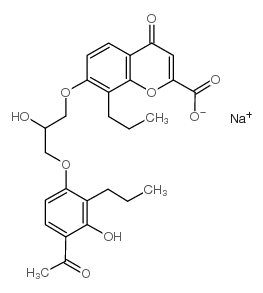Inhibitory effect of ONO-1078 on specific binding of peptide leukotrienes to human lung crude membrane.
Daniel Yagoub, Marc R Wilkins, Angelina J Lay, Dominik C Kaczorowski, Diana Hatoum, Sarah Bajan, Gyorgy Hutvagner, Jack H Lai, Wengen Wu, Rosetta Martiniello-Wilks, Pu Xia, Eileen M McGowan
Index: Prostaglandins Leukot. Essent. Fatty Acids 51(3) , 163-71, (1994)
Full Text: HTML
Abstract
We investigated the effects of ONO-1078, a newly synthesized peptide leukotriene (p-LT antagonist, on the specific binding of radiolabelled [3H]-LTC4, [3H]-LTD4 and [3H]-LTE4 to a human lung crude membrane fraction (HLMF). The binding assay was performed under conditions in which [3H]-LTC4 and [3H]-LTD4 were not metabolized by HLMF; that is, the metabolism of LTC4 to LTD4 or LTE4 was almost completely prevented by pretreating HLMF with 5 mM acivicin at 37 degrees C for 180 min, and metabolism of LTD4 to LTE4 was inhibited by including 5 mM L-cysteine and 5 mM glycine in the assay. [3H]-LTD4 specific binding was potently and concentration-dependently dissociated by ONO-1078. Its potency was 180-fold stronger than that of FPL 55712, a standardized p-LT antagonist, whereas high concentrations of ONO-1078 similar to those of FPL 55712 were required to inhibit [3H]-LTC4 specific binding. The rank order of the inhibitory potencies of p-LT agonists and antagonists for [3H]-LTD4 specific binding was LTD4 > ONO-1078 > LTE4 > LTC4 > FPI 55712. On the other hand, not only high concentrations of ONO-1078 and FPL 55712 but also more than a 100-fold excess of unlabelled LTE4 was required to inhibit [3H]-LTE4 specific binding, indicating that the binding sites do not appear to be receptors of LTE4. From these results, it is suggested that ONO-1078 is a highly potent LTD4 antagonist which is expected to be very effective on bronchial asthma.
Related Compounds
| Structure | Name/CAS No. | Molecular Formula | Articles |
|---|---|---|---|
 |
FPL 55712
CAS:40786-08-1 |
C27H29NaO9 |
|
Strategies in the design of peptidoleukotriene antagonists.
1993-01-01 [J. Lipid Mediat. 6(1-3) , 265-73, (1993)] |
|
Leukotriene receptor blockade in experimental heart failure.
1997-01-01 [Res. Exp. Med. (Berl.) 197(4) , 177-87, (1997)] |
|
Leukotriene cysLT1 (LTD4) receptor antagonism of H1-antihist...
1997-03-01 [Inflamm. Res. 46 Suppl 1 , S93-4, (1997)] |
|
Effects of atropine, acetylsalicylic acid, FPL 55712, and ph...
1989-06-01 [Eur. Respir. J. 2(6) , 517-21, (1989)] |
|
In vitro effect of DP-1904, a novel anti-asthma agent, again...
1998-08-01 [Pharmacol. Res. 38(2) , 141-7, (1998)] |